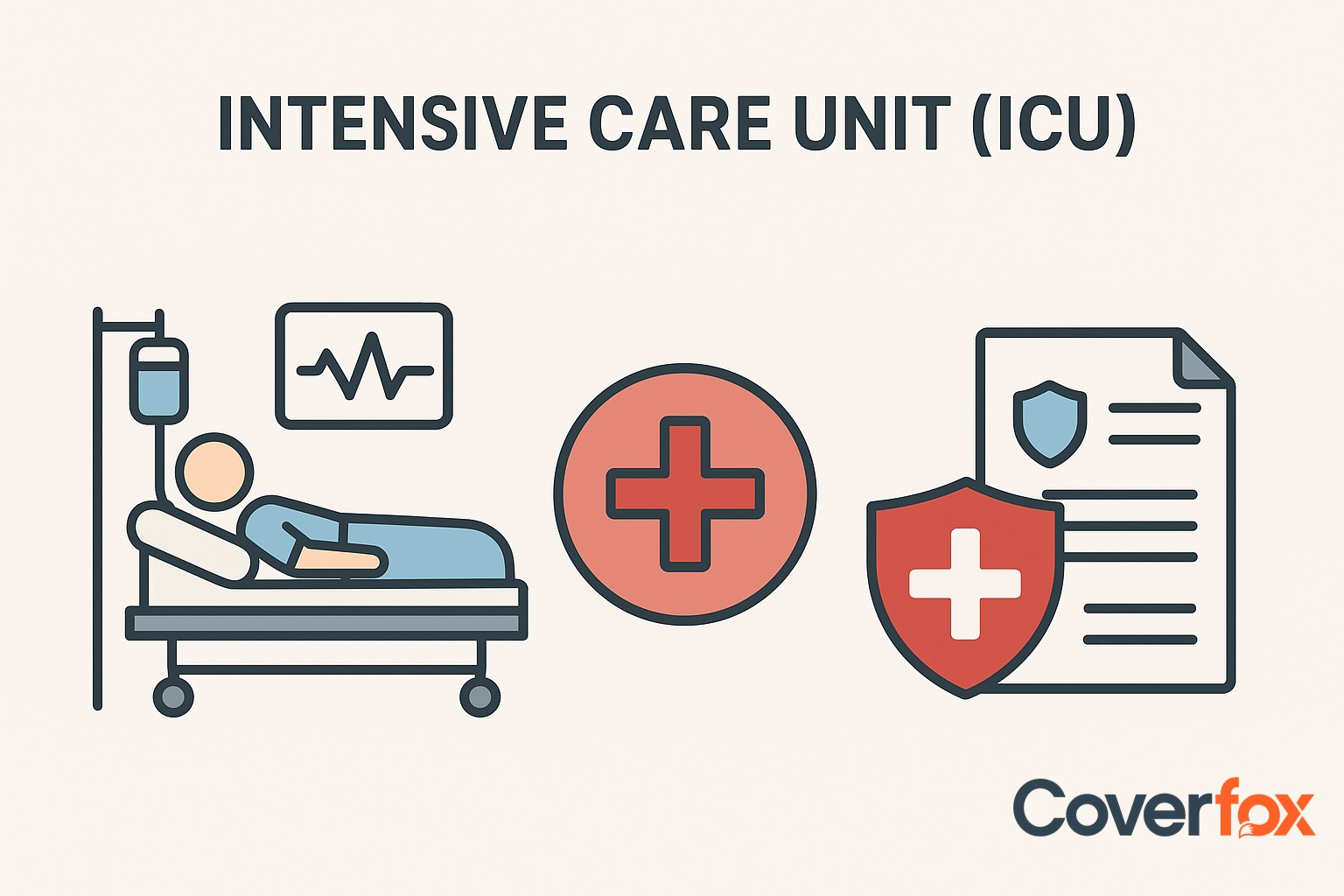We have often heard about people being admitted to the ICU in a hospital. But while this may be a popular department, there is still limited information available about it. To put it simply, it is a specialised department that offers care to patients who are facing severe, life-threatening health conditions.

To understand further in depth about them, the article below covers what an ICU is, how it differs from a normal ward, the various types of ICU found in hospitals, and its role in a health insurance policy.
What is the Meaning of ICU?
The ICU full form in medical terms stands for Intensive Care Unit and is a specialised department in hospitals offering a high level of medical support and timely intervention to critically ill patients. The priority of this department lies in stabilising the ICU patient during life-threatening conditions and facilitating their recovery with constant monitoring and modern life support techniques.
How the ICU Differs from a Normal Hospital Ward?
What are the major differences between a normal ward in the hospital and the medical Intensive Care Unit (ICU)? To answer this, take a look at the table given below:
| Aspect | ICU | Regular Hospital Ward |
|---|---|---|
| Condition of the Patient | The patient is considered critically ill and unstable | Patient is either stable or recovering |
| Medical Attention Needed | Constant attention is needed, such as 24/7 monitoring | Checks are required periodically |
| Staffing Ratio | It has a low patient-to-nurse ratio (more nurses per patient) | It has a higher patient-to-nurse ratio |
| Equipment | Consists of ventilators, cardiac monitors, and life-support systems | Consists of basic hospital equipment |
| Environment | Controlled environment, is sterile and has limited visitation | Less restricted and has standard hygiene |
| Doctor Expertise | Consists of specialists in critical care medicine | Consists of general physicians and ward doctors |
| Purpose | Involves life-saving treatment and intensive monitoring | Involves routine care, recovery, or rehabilitation |
Also Read: Essential Guide: First Aid in Emergency Cases
Types of ICUs Found in Hospitals
There may be different types of ICUs in hospitals that cater to different medical needs. These types of ICUs include:
Medical ICU (MICU)
Surgical ICU (SICU)
Cardiac Care Unit (CCU)
Neuro ICU
Paediatric ICU (PICU)
Neonatal ICU (NICU)
For people with serious illnesses like infections, organ failure, or poisoning.
For people recovering from major surgeries.
For patients with heart issues, such as a heart attack or irregular heartbeat.
For people with brain or nerve problems, such as stroke or head injury.
For children who are very sick or need care after surgery.
For newborn babies, especially premature or weak ones.
Common Reasons Patients Are Sent to the ICU
The ICU helps monitor and treat patients with critical, life-threatening illnesses or injuries. These could include conditions such as:
- Sepsis (life-threatening infection causing organ failure)
- Acute respiratory failure, including ARDS (severe lung inflammation)
- Heart attack (blocked blood flow to the heart)
- Stroke (interrupted blood supply to the brain)
- Traumatic brain injury (head trauma causing swelling or damage)
- Severe pneumonia (critical lung infection)
- Kidney failure (need for dialysis and close monitoring)
- Severe burns (large or critical burns needing intensive care)
- Multiple organ failure (failure of two or more organs)
- Post-surgery complications requiring intensive monitoring
- Poisoning or drug overdose emergencies
- Serious trauma from accidents requiring critical care
Major Machines and Tools Used in the ICU
Curious to know about the medical devices that help monitor a patient in the ICU? Then, here is the list of tools and equipment that can be found in an ICU:
Ventilator
Patient Monitor
Infusion Pump
Syringe Pump
Dialysis Machine
Feeding Tube
Central Venous Catheter (CVC)
Foley Catheter
Pulse Oximeter
Defibrillator
Helps patients breathe when they cannot breathe on their own.
Shows important signs like heart rate and blood pressure.
Gives fluids or medicine steadily through an IV.
Delivers small amounts of medicine slowly and accurately.
Cleans the blood when the kidneys are not working well.
Delivers food in liquid form to patients who cannot eat.
A tube in a big vein for medicine or blood tests.
A tube that helps drain urine from the bladder.
Checks oxygen levels by clipping on a finger or ear.
Delivers a shock to the heart to fix a stopped or irregular heartbeat.
Role of Health Insurance in ICU Expenses
A health insurance policy becomes crucial to cover the expenses of staying in the Intensive Care Unit (ICU). A good plan helps cover the costs of ICU room charges, doctor fees, medicines, ventilator use, and even laboratory tests, which could otherwise be very expensive. However, coverage could differ based on the insurer and policy type, so make sure to check these details in advance before purchasing a policy.
Conclusion
In all, an ICU or medical Intensive Care Unit offers advanced monitoring and expert care that plays a vital role in saving lives. Make sure to choose the right health insurance policy that covers ICU expenses, providing much-needed financial protection in times of critical moments. Simply head over to Coverfox for a secure policy purchase process, easy renewals and seamless claims support!
Frequently Asked Questions
What are the pipes or tubes used in the ICU?
There are various tubes used in an ICU for different purposes. These could be ventilator tubes for breathing, feeding tubes to maintain nutritional intake and IV tubes to supply fluids or medicines.
What does a ventilator do in the ICU?
A ventilator is an important machine that provides oxygen or carbon dioxide to patients who cannot breathe properly on their own.
What is the average cost of staying in an ICU in India?
The cost depends on factors like the hospital, the nature of the condition, and the procedures required. In general, the average cost of staying in a medical Intensive Care Unit (ICU) in India may range anywhere between Rs. 15,000 and Rs. 30,000 per day.
Are ICU expenses covered by health insurance?
Yes, various ICU expenses like room charges, doctor fees, medicines, ventilator use, and laboratory tests can be covered by a health insurance policy. However, coverage may differ based on policy type and insurer.
How long does a patient usually stay in the ICU?
The time required for a patient to stay in the ICU depends on the severity of their condition and recovery process. It could last anywhere from hours to several days or even months.
What should family members know during an ICU stay?
Family members should stay calm, remain informed and be supportive. They should also abide by all the necessary hospital guidelines for a smooth stay.





